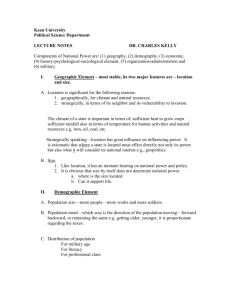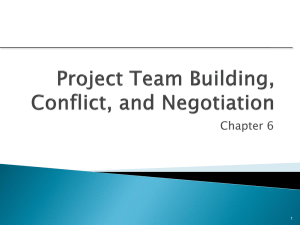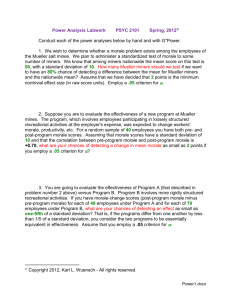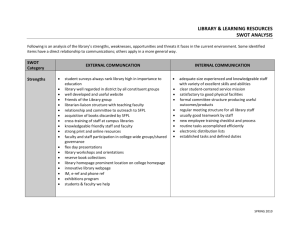Maintaining High Morale
advertisement
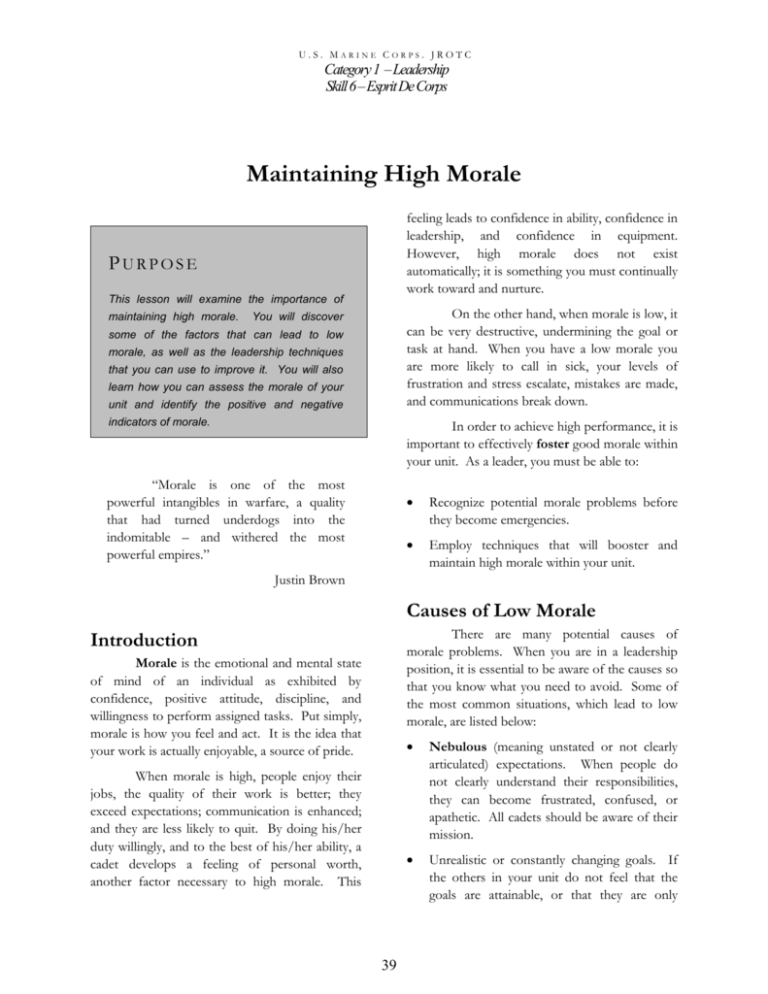
U.S. MARINE CORPS. JROTC Category 1 – Leadership Skill 6 – Esprit De Corps Maintaining High Morale feeling leads to confidence in ability, confidence in leadership, and confidence in equipment. However, high morale does not exist automatically; it is something you must continually work toward and nurture. PURPOSE This lesson will examine the importance of maintaining high morale. On the other hand, when morale is low, it can be very destructive, undermining the goal or task at hand. When you have a low morale you are more likely to call in sick, your levels of frustration and stress escalate, mistakes are made, and communications break down. You will discover some of the factors that can lead to low morale, as well as the leadership techniques that you can use to improve it. You will also learn how you can assess the morale of your unit and identify the positive and negative indicators of morale. In order to achieve high performance, it is important to effectively foster good morale within your unit. As a leader, you must be able to: “Morale is one of the most powerful intangibles in warfare, a quality that had turned underdogs into the indomitable – and withered the most powerful empires.” Recognize potential morale problems before they become emergencies. Employ techniques that will booster and maintain high morale within your unit. Justin Brown Causes of Low Morale There are many potential causes of morale problems. When you are in a leadership position, it is essential to be aware of the causes so that you know what you need to avoid. Some of the most common situations, which lead to low morale, are listed below: Introduction Morale is the emotional and mental state of mind of an individual as exhibited by confidence, positive attitude, discipline, and willingness to perform assigned tasks. Put simply, morale is how you feel and act. It is the idea that your work is actually enjoyable, a source of pride. When morale is high, people enjoy their jobs, the quality of their work is better; they exceed expectations; communication is enhanced; and they are less likely to quit. By doing his/her duty willingly, and to the best of his/her ability, a cadet develops a feeling of personal worth, another factor necessary to high morale. This 39 Nebulous (meaning unstated or not clearly articulated) expectations. When people do not clearly understand their responsibilities, they can become frustrated, confused, or apathetic. All cadets should be aware of their mission. Unrealistic or constantly changing goals. If the others in your unit do not feel that the goals are attainable, or that they are only U.S. MARINE CORPS. JROTC Category 1 – Leadership Skill 6 – Esprit De Corps temporary, they will not be motivated to try to achieve them. Lack of training and resources. When people feel that they have not been properly trained to accomplish their assigned task, they lose confidence. They are likely to feel that the leadership is not supporting them, and that they are being denied the knowledge, skills and tools they need to succeed. Poor Leadership and Communication. Leaders need to act as role models. If a leader is unenthusiastic, and generally shows a lack of commitment, the people that he/she leads will likely emulate that attitude. Likewise, an inaccessible, moody or highly critical leader can instantly kill the enthusiasm of a team. Personal appearance and hygiene. Is the cadet well groomed? Is his/her uniform neat and pressed? Personal conduct. Does the cadet engage in appropriate behavior? Standards of military courtesy. Does the cadet answer with “Sir or Ma’am”? Does he or she salute and return salutes as appropriate? Does the cadet follow other military protocol? Use of recreational facilities. Does your unit have recreational facilities? Does the cadet use them? Does he/she willingly participate in team activities? Interpersonal relations. How well does the cadet interact with other cadets? Is he/she willing to help other team members or does he/she exhibit an uncooperative attitude? Have you observed friendly and positive interactions with others? Condition of mess and quarters. Are the mess and quarters clean and neat? Care of equipment. Is the equipment issued to the cadet in good repair? Has it been cleaned and polished? Does the cadet care for issued equipment as if it were his/her own personal property? Indicators of Morale In order to make good decisions regarding morale, you must be able to recognize the signs of a potential problem. In fact, awareness is the first step in managing morale within your unit. Of course, you need to know what to look for. A cadet will not likely say to you, “I am experiencing low morale. Can you help me?” Instead, you are going to have to do some detective work. A leader can measure morale within his/her unit through close observation of their cadets in their daily activities, frequent inspections, and routine conversations or counseling. Although morale is an internal feeling or attitude, it does manifest itself in some outward signals. The following are some indicators, or outward signs of morale. They can either be positive, signaling high morale in your unit, or they could be negative, signaling a potential morale problem. 40 U.S. MARINE CORPS. JROTC Category 1 – Leadership Skill 6 – Esprit De Corps Response to orders and directives. Does the cadet willingly accept new responsibilities? Does he or she show deference to superiors? Motivation during training. Does the cadet seem interested in learning new skills? Does he/she actively participate in the training activities? Arrests, military or civilian. Has the cadet been arrested? Requests for transfers. Has the cadet asked to be re-assigned to another unit? Sick call rate and unauthorized absences. Does the cadet frequently call in sick or come in late? Attendance and punctuality are clear indicators of a person’s level of commitment. Re-enlistment rates. rates gone down? Use and abuse of drugs and alcohol. Have you noticed and signs of drinking or drug use? Has the cadet arrived at a function drunk or on drugs? Do you have any other reason to suspect a drinking or drug problem? There are a number of techniques that you employ to foster good morale, and they are all consistent with the principles of leadership. In other words, a good leader will continually foster high morale within his or her unit. The following are some of the methods that you can use to improve morale: Know your cadets, their motivations and aspirations, and demonstrate your concern for their physical, mental, and spiritual welfare. Also demonstrate concern for the welfare of their families. Recognize their individuality, and treat them accordingly. Carefully consider job assignments in order to best match your cadets’ abilities and desires with the available assignments. Be enthusiastic and set a good example. Keep your cadets informed. When time and security permit, a leader should inform the cadets in his/her unit of all happenings and give reasons why things are to be done. This information makes individuals feel that they are a part of the team, and not just an outsider looking in. The key to giving out information is to be sure that the cadets have enough information to do their job intelligently and to Have the enlistment The presence of any one of these indicators in the negative does not mean that you have a de facto morale problem, but rather you need to do some more investigation to get to the bottom of the problem. Likewise, one positive indicator does not necessarily mean a condition of high morale. Techniques to Improve and Foster High Morale Now that you know what to look for, what can you do if you detect a problem with morale in your unit? What can you do to improve morale, and possibly prevent future problems? 41 U.S. MARINE CORPS. JROTC Category 1 – Leadership Skill 6 – Esprit De Corps inspire their initiative, enthusiasm, loyalty, and convictions. assistance, not only in military matters, but for personal problems as well. Instill a belief in the mission. Foster the feeling that each cadet is essential to the unit. Instill in your cadets confidence in themselves, their leaders, their training and their equipment. Develop a sense of responsibility among your cadets. Assign tasks and delegate the authority to accomplish the tasks. This promotes mutual confidence and respect between the leader and his/her team. It also encourages initiative. When you properly delegate authority, you demonstrate faith in your cadets and increase their desire for greater responsibilities. If you fail to delegate authority, you indicate a lack of leadership, and your subordinates may take it to be a lack of trust in their abilities. If you use these effective leadership techniques, you will build morale within your unit and you will have a strong and high performing team. High morale gives you a feeling of confidence and well being, and enables you to face hardship with courage, endurance, and determination. Ensure that tasks are understood, supervised, and accomplished. Before you can expect your cadets to perform, they must know what is expected of them. You must communicate your instructions in a clear, concise manner, and talk at a level that your cadets are sure to understand, but not at a level that would insult their intelligence. Before your cadets start a task, allow them a chance to ask questions or seek advice. Make sure that awards and rewards are passed out as quickly as punishment. Identify and remove any causes for misunderstanding or dissatisfaction. Ensure your cadets know the procedures for registering complaints, and that action is taken promptly to resolve complaints. Be approachable. Cadets should feel comfortable coming to you for advice and Conclusion The Marine Corps’ performance and effectiveness in battle has been linked to our highcaliber morale. Maintaining that morale is a priority. Our leaders must be able to anticipate potential morale problems before they occur and identify the warning signs of low morale. By continually practicing leadership techniques that foster high morale, we become indomitable. 42

